
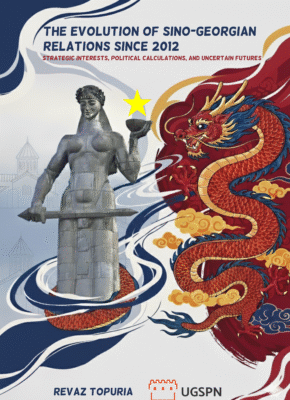 The Evolution of Sino-Georgian Relations Since 2012: Strategic ...
The Evolution of Sino-Georgian Relations Since 2012: Strategic ...
This article provides a comprehensive analysis of the transformation in Sino-Georgian relations since 2012, highlighting how bilateral ties have evolved from limited economic engagement into a formal strategic partnership. It situates this evolution within China’s more assertive foreign policy under Xi Jinping, embodied in the Belt and Road Initiative and Georgia’s strategic recalibration under the Georgian Dream government. The study examines China’s motivations, including logistical access via the Middle Corridor, political diversification in the Black Sea region, and symbolic partnership with a cooperative democracy. It explores Georgia’s calculus in seeking alternative sources of investment, hedging against Western conditionality, and leveraging the relationship for domestic legitimacy. The article then assesses key risks: the asymmetry of power and unmet expectations, the tension between Georgia’s Euro-Atlantic aspirations and deeper ties with China, the waning momentum of the BRI, and the fragility of a pragmatism-based partnership. In conclusion, it argues that without stronger institutional mechanisms and clearer strategic objectives, the Sino-Georgian partnership is likely to remain symbolic rather than transformative, offering cautionary lessons for small-state diplomacy in a multipolar world.
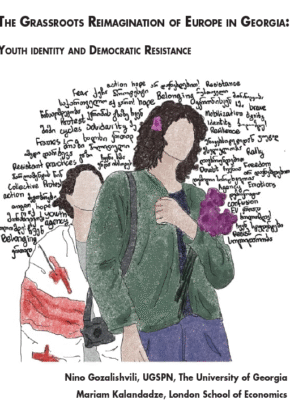 The Grassroots Reimagination of Europe in Georgia: Youth ...
The Grassroots Reimagination of Europe in Georgia: Youth ...
Youth resistance in Georgia has emerged as a key actor within the landscape of non-parliamentary opposition. This paper examines how university students mobilised during the 2024 protests, not simply to contest a piece of legislation, but to engage in broader acts of political redefinition and identity reclamation. Drawing on twenty-eight ethnographic diaries, the paper investigates how emotional, symbolic, and generational practices are deployed by young activists to articulate belonging, citizenship, and resistance outside formal political institutions.
Rather than acting in coordination with the parliamentary opposition, students build their own oppositional identity through emotionally charged practices such as “identity marches,” protest rituals, and symbolic appropriation of public space. These actions reveal how emotions—particularly anger, hope, fear, pride, and confusion—function as more than expressive tools: they structure participation, forge horizontal solidarities, and sustain collective motivation over time.
The analysis highlights how students reinterpret national and European belonging as affective and civic projects, positioning themselves in opposition to both Russian influence and domestic political elites. Their actions suggest a transformation of Europeanisation from a top-down institutional narrative into a lived, grassroots civic identity. This case contributes to broader discussions on how extra-institutional opposition actors generate political agency in post-communist hybrid regimes.
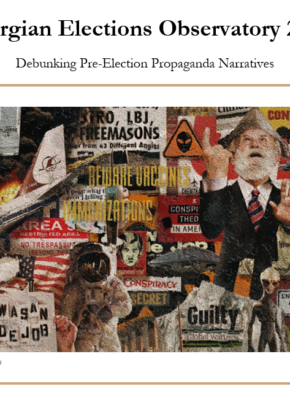 The Georgian Elections Observatory 2024
The Georgian Elections Observatory 2024
The Georgian Elections Observatory (#GEObservatory24) is a short-term initiative focused on fact-checking pre-election narratives in the lead-up to the parliamentary elections on October 26. Unlike traditional fact-checking platforms, this project goes beyond verifying individual claims by analyzing entire narratives. It combines political analysis with fact-checking and media analysis to provide a comprehensive understanding of the pre-election discourse. The project is supported by the Fojo Swedish Media Institute in collaboration with the Investigative Media Lab (IML) and the UG Security, Policy, and Nationalism Research Center (UGSPN).
DISCLAIMER: The views expressed in these stories do not necessarily reflect those of the listed organizations.
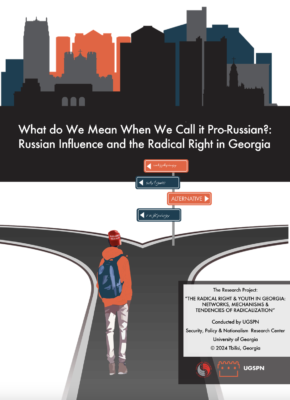 The Radical Right and Youth in Georgia: Networks, ...
The Radical Right and Youth in Georgia: Networks, ...
This research analyzes contemporary trends of radicalization within Georgia, with a specific focus on the
young adult demographic. Central to this study is the deconstruction of mobilization strategies employed by the radical right, understanding their appeal among young supporters, and illuminating the motivations behind their engagement with various radical-right discourses and groups. Additionally, the analysis unpacks the commonly attributed “pro-Russian” label associated with the Georgian far right and explain the nuances of this association.
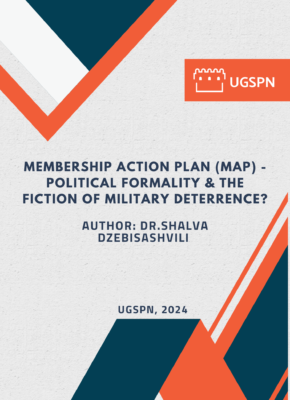 Membership Action Plan (MAP) – Political Formality & ...
Membership Action Plan (MAP) – Political Formality & ...
"If the political ends are vague or unspecified, how can you choose methods and means that are fit for purpose" - Colin Gray
Since the Bucharest summit declaration that promised the NATO-membership to Ukraine and Georgia, the option of the membership action plan (MAP) - formally the only mechanism for joining the alliance - became increasingly controversial, politicized and questionable, putting the credibility of the Alliance and its promises under the big question mark. The article doubles down on the debatable value of the MAP from the perspective of military deterrence and argues that the current version of the membership action plan does nothing whatsoever to increase the deterrent of a membership candidate, and in contrary, may lead to a much higher probability of military threat, i.e. aggression. Hence, the MAP appears to acquire a purely formal nature, with no practical applicability and military value to secure the membership process itself. Realizing this but not admitting it openly, the alliance is therefore trapped in its hesitance to decide on membership, thus effectively "donating" the veto right to a revisionist country that actively opposes the enlargement policy. The rapid inclusion of Finland and Sweden in NATO without formally activating the MAP-procedure, is reviewed as the vivid demonstration and testimony of the accuracy of arguments provided in the article.